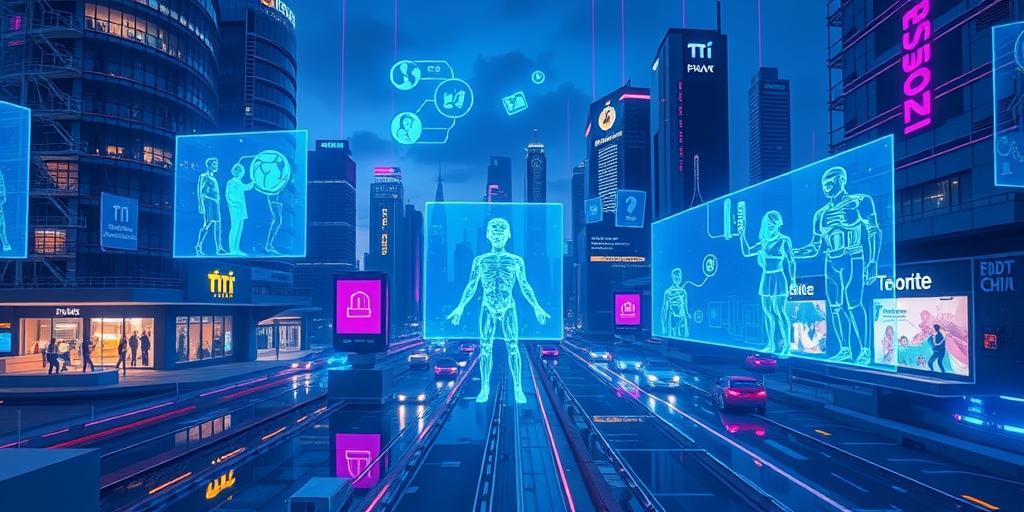AI-Generated Content: Threat or Opportunity for Entertainment in 2025?
The entertainment landscape is in constant flux, and the rise of AI-generated content is poised to be a major disruptor. By 2025, we can anticipate even more sophisticated AI tools capable of producing everything from scripts and music to visual effects and even entire virtual worlds. But is this a threat to human creativity, or an unprecedented opportunity for innovation? Let’s examine the potential impacts.
The Rise of AI in Entertainment
AI’s foray into entertainment is already underway. We see AI algorithms composing music, generating realistic images, and even writing scripts for short films. These advancements raise fundamental questions about the future role of human artists and creators.
Current Applications Include:
- Scriptwriting: AI tools can analyze successful scripts and generate new ones based on popular themes and character archetypes.
- Music Composition: AI can create original music in various styles, potentially democratizing music production.
- Visual Effects: AI accelerates the creation of visual effects, making high-quality graphics more accessible to independent filmmakers.
- Game Development: AI can generate landscapes, characters, and even gameplay scenarios, streamlining the game development process.
The Threat Perspective
One major concern is the potential displacement of human artists. If AI can produce content faster and cheaper, studios might be tempted to replace writers, musicians, and visual effects artists with AI-driven solutions. This could lead to a concentration of power in the hands of companies that own the AI technology, further marginalizing independent creators. Here are some of the main points of concerns:
- Job Displacement: The automation of creative tasks could lead to job losses for artists and entertainers.
- Homogenization of Content: Over-reliance on AI could lead to formulaic content that lacks originality and artistic depth.
- Copyright Issues: Determining ownership of AI-generated content is a complex legal challenge.
- Devaluation of Human Creativity: The perception of art as a commodity could intensify if AI-generated content floods the market.
The Opportunity Perspective
However, AI also presents a wealth of opportunities for the entertainment industry. It can serve as a powerful tool for augmenting human creativity, streamlining production processes, and opening new avenues for storytelling. Here are some potential benefits:
- Enhanced Creativity: AI can help artists overcome creative blocks by generating ideas and exploring new possibilities.
- Increased Efficiency: AI can automate tedious tasks, freeing up artists to focus on more creative aspects of their work.
- Democratization of Content Creation: AI can make content creation more accessible to individuals with limited resources or technical skills.
- New Forms of Entertainment: AI can facilitate the creation of interactive and personalized entertainment experiences.
Striking a Balance
The key to navigating the AI revolution in entertainment lies in striking a balance between technological innovation and human creativity. Instead of viewing AI as a replacement for artists, we should embrace it as a tool that can empower them to create even more compelling and innovative content. It will be necessary to consider both education and regulation.
Strategies for a Balanced Approach:
- Focus on Augmentation: Utilize AI to enhance human creativity, rather than replacing it entirely.
- Invest in Education: Train artists and creators to use AI tools effectively.
- Develop Ethical Guidelines: Establish standards for the responsible use of AI in entertainment.
- Promote Collaboration: Encourage collaboration between AI and human artists to foster innovation.
The Future of Entertainment
By 2025, AI will likely be deeply integrated into the entertainment industry, impacting every stage of the content creation process. Whether this integration is viewed as a threat or an opportunity will depend on how we choose to manage its development and deployment. By embracing a balanced and ethical approach, we can harness the power of AI to create a more vibrant, diverse, and innovative entertainment landscape for all.
In conclusion, the future of entertainment is undoubtedly intertwined with AI. While challenges exist, the opportunities for innovation and creativity are immense. The key is to approach AI not as a replacement for human talent, but as a powerful tool that can amplify our creative potential and shape the future of entertainment in exciting new ways.
